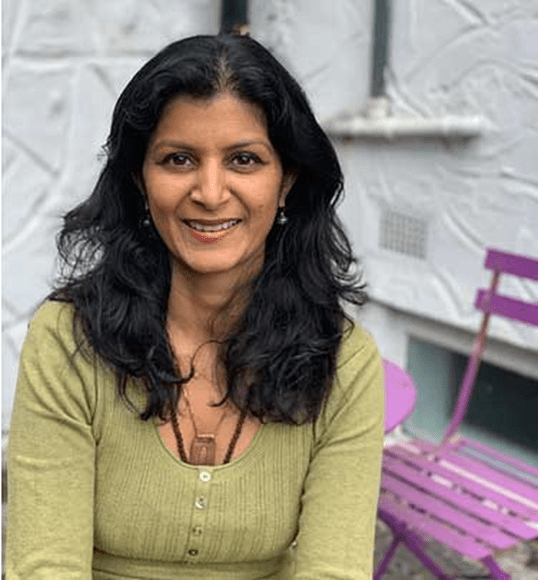
Jeyanthi Nair: A Compass in the Labyrinth of Health and Wealth — My Story of Transformation and Empowerment
In the realms of health and wealth, the intricate connections and interdependencies have long intrigued both scholars and ordinary people alike. In this riveting interview with Global Woman Magazine, we dive deep into this labyrinth, seeking answers on menopause, stigma, holistic health, and the transformative power of nutritional choices.
Unravelling her own journey from struggling with hormonal imbalances to becoming an acclaimed health and wellness coach, Jeyanthi shares valuable insights about the intersection of physical, emotional, and financial well-being.
Through her inspiring stories and practical advice, she illuminates the path for women around the world to reclaim control of their health and lives. This interview sets the stage for a candid discussion on nutrition, mindset, the power of understanding, and the importance of a holistic approach to overall well-being.
It is an exploration of the undeniable interconnectedness of health and wealth, and a testament to the extraordinary impact of women’s empowerment in personal and professional spheres. From confronting stigmas around illness to crafting a sustainable and empowering weight loss approach, this discussion forms an enlightening narrative that has the potential to redefine our approach to well-being and prosperity.

A Compass in the Labyrinth of Health and Wealth
Global Woman — Interview
In the realms of health and wealth, the intricate connections and interdependencies have long intrigued both scholars and ordinary people alike. In this riveting interview with Global Woman Magazine, we dive deep into this labyrinth, seeking answers on menopause, stigma, holistic health, and the transformative power of nutritional choices.
Do health and wealth correlate or cross over?
Wealth can have a direct impact on health. Higher socioeconomic status often correlates with better access to healthcare, nutritious food, safe living conditions, and opportunities for physical activity. Financial stability can contribute to reduced stress levels, which in turn can positively affect overall health and well-being.
Conversely, health can influence wealth. Good health enables individuals to be more productive, maintain steady employment, and pursue opportunities for career advancement. It can also reduce healthcare expenses and prevent financial burdens caused by medical conditions.
How do you help women experiencing menopausal phases, including perimenopause, to improve this situation?
It can be a challenging time for women experiencing menopausal symptoms. It’s important to note that approximately 80% of women go through various symptoms during this phase, and many are unaware of the available strategies to improve their situation and thrive. The impact of these symptoms extends beyond the physical realm, affecting their work, relationships, friendships, and, most importantly, their self-perception.
To address these challenges, I provide comprehensive support to empower women to take charge of their lives. Firstly, I guide them in developing a positive and healthy relationship with food. This involves understanding the nutritional needs specific to this phase of life and enabling them to make informed choices that can alleviate symptoms and promote overall well-being.
Moreover, I encourage women to explore and understand their personal and health triggers more deeply. By delving into their individual circumstances, we can identify specific factors that may aggravate symptoms and develop bespoke strategies to manage them effectively. I prioritise education and knowledge sharing as fundamental pillars of my approach. By equipping women with the necessary information, resources, and tools, I empower them to make informed choices and live the fulfilling lives they desire.
Do you think that the stigma behind illness disrupts the process of finding practical solutions? How can we lift this stigma?
Yes, it definitely can. The stigma applies more to mental health disorders and illnesses. But there are still “physical” illnesses that are stigmatized, e.g., AIDS, specific skin diseases, and sexual health.
It creates barriers to seeking help, hinders open conversations, and restricts support systems.
To lift this stigma, several strategies can be employed, for example, education and awareness campaigns to increase empathy and understanding, encouraging open dialogue about illnesses and allowing people to share their experiences without judgement through talks, workshops, and community work.
This is where I do a lot of work also advocating for policy changes that will protect the rights of those individuals.
Can you tell us about your holistic approach to managing health and what do you think this holistic attitude can teach people today?
My holistic approach to managing health involves teaching and coaching individuals through nutrition, mindset, and lifestyle considerations. I help them understand the impact of different foods on their mind and body without promoting a negative mindset or deprivation.
Instead, I gradually introduce foods that work well with their system and become part of their lifestyle.
I also work on their mindset, using various tools to foster a positive outlook. Additionally, I guide them towards a more natural way of living, helping them understand the impact on their health. This holistic attitude teaches people today about the importance of the mind-body connection, non-restrictive approaches, and conscious lifestyle choices for overall well-being.
In your experience as a coach, what has been your favourite success story?
One of my most cherished success stories as a coach involves a postmenopausal woman who was struggling with arthritis and was overweight. She constantly experienced the sensation of her fingers being on fire due to inflammation.
She was consuming 1-2 cans of cola daily, which was evidently detrimental to her health. Instead of telling her to stop immediately, I explained to her the impact of sugar on her body and mind, taking into account her high stress levels.
Together, we discussed finding a middle ground that would be agreeable to her. We agreed to start by reducing her cola intake to 1 can on alternate days. Within just two weeks, she expressed her readiness to completely give up the cola. Remarkably, within a few days of quitting, the intense burning sensation in her fingers, which she had considered normal for decades, subsided.
This positive change in her cola consumption was just the beginning. Motivated by her initial success, she embarked on a transformative journey and went on to lose an impressive 3 stones. Witnessing her transition from accepting pain as the norm to embracing a healthier lifestyle and experiencing remarkable improvements is truly inspiring and fuels my passion for coaching others on their journeys to well-being.
Which foods are the most medicinal and have the most powerful health benefits to the mind in particular?
Research suggests green, leafy vegetables may help slow cognitive decline. Fatty fish (omega 3) is linked to lower blood levels of beta-amyloid, the protein that forms damaging clumps in the brains of people with Alzheimer’s disease.
Berries are known as “flavonoids,” the natural plant pigments that give berries their brilliant hues and help improve memory. Walnuts are high in a type of omega-3 fatty acid called alpha-linolenic acid (ALA). Diets rich in ALA and other omega-3 fatty acids have been linked to lower blood pressure and cleaner arteries. This is good for both the heart and the brain.

You have recently launched a product with your husband. Where does your product find its competitive edge and how has creating together with family offered an advantage?
By combining nutrition with psychotherapy, we provide a holistic approach to addressing the physical and mental aspects of our clients’ health. We incorporate Sukan’s expertise in BWRT, a therapy that focuses on identifying and modifying unwanted behaviour patterns and limiting beliefs.
By guiding clients through exploring their food triggers and replacing them with preferred responses, we help them develop a sustainable and healthy relationship with food. Creating a safe space for clients to undergo this transformation over 12 weeks is crucial for their success.
It enables them to emerge feeling renewed and confident about maintaining a healthy lifestyle. The collaboration has also been personally transformative for both of us. Working together to create this unique approach has challenged our beliefs and expanded our understanding of the intersection between nutrition and psychotherapy. Embracing personal growth and learning can lead to even greater empathy and effectiveness in helping our clients.
Overall, our collaborative effort offers a comprehensive and powerful solution for clients seeking lasting change in their health and well-being.
What is one secret to weight loss that you wish you could teach everyone struggling with their weight?
Consuming healthy fats. There’s a misconception that all fats are unhealthy and contribute to weight gain, which has been challenged by emerging research. In fact, incorporating the right types of fats into our diet can play a pivotal role in restoring and maintaining a healthy state.
It is important to shift away from fat-free or low-fat food options, as they often contain additives and excessive sugar to compensate for the lack of flavour and texture, ultimately compromising their nutritional value.
Instead, embracing sources of healthy fats, such as avocados, nuts, seeds, olive oil, fatty fish, and flaxseeds, can provide numerous benefits, including improved heart health, enhanced brain function, and reduced inflammation in the body.
You have a retreat coming up this June in the Austrian Alps. Who is your retreat for and what does it aim to do?
This retreat is specifically designed for perimenopausal and menopausal women. Additionally, it welcomes those who may be uncertain about their current phase. The retreat aims to provide a much-needed opportunity for these women to unwind, recuperate, and prioritize their well-being.
We understand that women often lead busy and stressful lives, and so we aim to address that by offering a space for them to release tension and recharge. Through coaching techniques and Neuro-Linguistic Programming (NLP), we work with participants to identify and overcome limiting beliefs that may be hindering their personal growth and well-being.
In addition to the mindset aspect, we also focus on providing valuable nutrition education and fostering interactive discussions. By equipping women with knowledge about proper nutrition during this phase of life, we empower them to make informed choices that support their overall health and well-being.
How does your story represent women’s empowerment, Global Woman Club’s core mission?
My personal journey represents a powerful example of women’s empowerment, closely aligning with Global Woman Club’s core mission. Like many women I have encountered in my work, I embarked on studying nutrition due to my own struggles during the initial stages of perimenopause. It took years for me to realize that a hormone imbalance was the underlying cause of the feelings of depression, confusion, and profound unhappiness that I experienced.
By sharing my story, I am shedding light on a commonly overlooked aspect of women’s health. I raise awareness about the impact of menopause on mental and emotional well-being, encouraging women to seek understanding and support during this transition.
My commitment to studying nutrition and helping other women navigate similar challenges exemplifies empowerment through knowledge and education. By providing guidance, I aim to break the stigma surrounding menopause and mental health, encouraging women to seek the necessary support and take proactive steps towards their own empowerment.
Where do you see yourself pioneering the most growth in your industry in the next 5-10 years?
Firstly, I see a growing emphasis on personalized nutrition and tailored approaches to health. I am excited about analysing individual genetic profiles, gut microbiomes, more and more in my practice. It is something I already incorporate but I feel there’ll be more emphasis on this in the coming years and I aim to be at the forefront of this movement.
Secondly, I anticipate a greater integration of holistic approaches in mainstream healthcare. The recognition of the mind-body connection and the importance of addressing mental and emotional well-being alongside physical health will become more prevalent.
Furthermore, I see a crucial opportunity for improving workplace awareness of menopause. Menopause can impact productivity and well-being. By advocating for greater awareness and education, I aim to create a positive shift in how organizations support and accommodate menopausal women. This may include implementing policies that provide flexibility, promoting open communication, and offering resources and support to navigate this transitional phase effectively.

Find Jeyanthi Nair Online:
SoulNourish – Nutritional Therapist in London, Jeyanthi Nair






